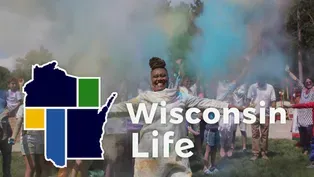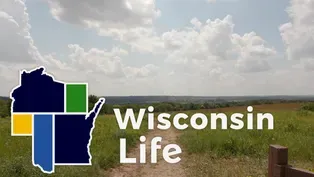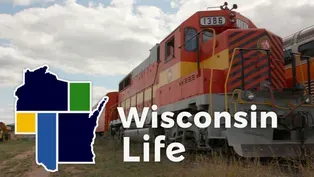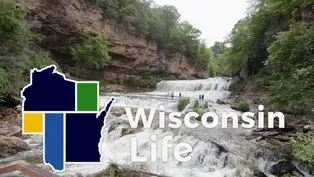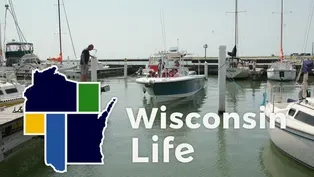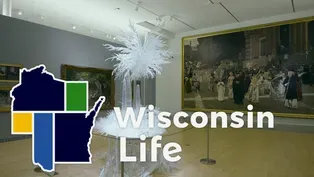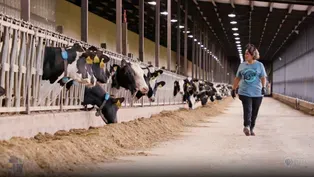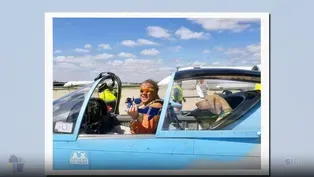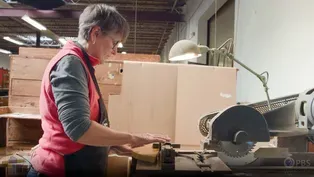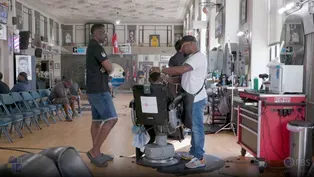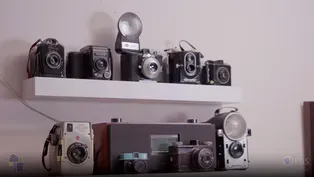
Riverview Gardens in Appleton
Season 10 Episode 5 | 26m 48sVideo has Closed Captions
We tour Riverview Gardens in Appleton, a non-profit offering job training and employment.
Angela Fitzgerald visits Riverview Gardens in Appleton, an organization empowering people through job training and employment. The non-profit transformed a country club into a thriving farm growing produce on old golf fairways and lettuce in the pool house. We also meet a pilot rescuing pups and a barber on a mission to keep Milwaukee healthy.
Problems with Closed Captions? Closed Captioning Feedback
Problems with Closed Captions? Closed Captioning Feedback
Wisconsin Life is a local public television program presented by PBS Wisconsin
Funding for Wisconsin Life is provided by the Wooden Nickel Fund, Mary and Lowell Peterson, A.C.V. and Mary Elston Family, Obrodovich Family Foundation, Stanley J. Cottrill Fund, Alliant Energy, UW...

Riverview Gardens in Appleton
Season 10 Episode 5 | 26m 48sVideo has Closed Captions
Angela Fitzgerald visits Riverview Gardens in Appleton, an organization empowering people through job training and employment. The non-profit transformed a country club into a thriving farm growing produce on old golf fairways and lettuce in the pool house. We also meet a pilot rescuing pups and a barber on a mission to keep Milwaukee healthy.
Problems with Closed Captions? Closed Captioning Feedback
How to Watch Wisconsin Life
Wisconsin Life is available to stream on pbs.org and the free PBS App, available on iPhone, Apple TV, Android TV, Android smartphones, Amazon Fire TV, Amazon Fire Tablet, Roku, Samsung Smart TV, and Vizio.
Providing Support for PBS.org
Learn Moreabout PBS online sponsorshipMore from This Collection
Blackhawk Ski Club in Middleton
Video has Closed Captions
We explore the competitive side of winter sports with the Blackhawk Ski Club in Middleton. (26m 48s)
Holi Festival of Colors in Wausau
Video has Closed Captions
We celebrate the Holi Festival of Colors at the Monk Botanical Gardens in Wausau. (26m 49s)
Retzer Nature Center in Waukesha
Video has Closed Captions
Angela visits the wild side of Waukesha at the Retzer Nature Center and planetarium. (26m 48s)
Wisconsin Great Northern Railroad in Trego
Video has Closed Captions
All aboard the Wisconsin Great Northern Railroad for a historic ride in the Northwoods. (26m 48s)
Willow River State Park in Hudson
Video has Closed Captions
Explore Willow River State Park’s stunning waterfall, serene lake and endless trails. (26m 48s)
Sailing Education Association of Sheboygan
Video has Closed Captions
We learn about adaptive sailing with SEAS, the Sailing Education Association of Sheboygan. (26m 48s)
Museum of Wisconsin Art in West Bend
Video has Closed Captions
Celebrate artists in our state at MOWA, Museum of Wisconsin Art in West Bend. (26m 49s)
Providing Support for PBS.org
Learn Moreabout PBS online sponsorship- Announcer: The following program is a PBS Wisconsin Original Production.
- Coming up on Wisconsin Life: a dairy manager keeping things "moo"-ving, a barber on a mission, a photographer using a simple plastic camera to create complex photos, a craftswoman preserving the art of wood type, [ignition, engine cranks] and a pilot rescuing pups.
That's all ahead on Wisconsin Life!
[uplifting guitars, strings, piano, and drums] - Announcer: Funding for Wisconsin Life is provided by Lowell and Mary Peterson, Alliant Energy, donors to the Focus Funds for Wisconsin Programs, and Friends of PBS Wisconsin.
- Welcome to Wisconsin Life.
I'm Angela Fitzgerald.
We're seeing what's cropping up at Riverview Gardens, an organization empowering people through job training and employment on the path to self-sufficiency, all while growing 30,000 pounds of food a year for local food pantries.
The nonprofit is next to the Fox River near downtown Appleton.
This 72-acre property was once a bustling country club and golf course.
Now, the fairway has turned into rows of hoop houses or greenhouses.
The old pool house runs as a hydroponic system, producing more than 23,000 heads of lettuce a year.
It's a transformation of the land and a transformative experience for those in the program.
Riverview Gardens supports people overcoming multiple obstacles and barriers to employment, working towards self-sufficiency while building life and job skills.
That can look like different things... including participating in the culinary program, earning a bike with work hours, tending to the farm, maintenance, and setting up for events hosted in the community center.
We'll see what else is cultivating here, but first, let's head out to meet more people from our state.
[shimmery music] We're off to Newton to meet a dairy farm manager who's keeping things "moo-ving."
[twangy guitar] Sunrise over Lake Michigan signals the start of a new day at one of Manitowoc County's largest dairy farms.
- Rosario Ibarra: Hey, mommies!
I love to be involved in every area of the farm.
- Rosario Ibarra greets every day with a smile.
- Good morning!
- Despite the early morning wake-up call.
- Usually, my day starts at 5:00 am.
I arrive to the farm, and then, usually, I do a tour around the farm, checking that everything is okay, and I start to get calls.
Hi, Melanie, thank you.
Ah, yes, the interviews went very well.
- Farm life means Rosario is constantly on the go.
- I like to say hello to everybody in the farm.
- As the general manager, she supervises the daily operations at Grotegut Dairy Farm near Newton.
- Currently, in this farm, we are over 50 full-time employees, and 90% of them only speak Spanish.
- Mm-hmm, okay.
Ándele pues, Chuy.
¡Gracias!
Bye.
I should pay attention to my English teachers because I always used to say, "Why do I need to learn English?
I'm never going to use it."
And look at me!
- Growing up in Mexico, Rosario earned a science degree in soil management and crop production, opening doors for an internship in the dairy state.
- I was selected to do my professional practices here in Wisconsin, specifically in New Holstein.
- However, there was just one problem.
- I remember we saw this map of the US, and we're like, "Okay, we are here.
So, where is Wisconsin?"
When I arrived to the farm, I ask myself, "What the heck I'm doing here?"
And that was my first experience with cows, really.
That was the first time that I saw a real Holstein.
That's the reason I am here because someone gave me an opportunity.
- For more than a decade, Wisconsin has been home.
A place where dairy farming requires long hours and hard work.
- So, it's not for everyone, but someone has to do it.
For now, that person is me.
So, that's my focus.
Do it and do it right.
- As day turns to night, Rosario is back on the farm for a second round of evening chores.
- They are curious, and they know that it's time to get their milk.
[cow lowing 'moooooooooo-ooooooo'] So, it's a challenge when the time changes and it's dark.
Hey, princess, here, here; Come on!
Parece que están comiendo bien, hay le checan.
And usually, I am around the farm at this time.
There is a lot that I can do at night.
I do some of my office jobs at that moment because, usually, it's a quiet time.
[ink jet printing] And I can go home between 10, 11-ish pm.
Perfect!
Okay, Jorge, gracias.
Bye.
A good day at the farm is when we can go home with a clean conscience and with peace of mind.
- For Rosario, it's always 'farming with a smile.'
- Every day is different, so I just try to do my best.
It's a lifestyle, for sure.
♪ ♪ [cow moos] [shimmery music] - Next, we catch up with the Milwaukee Barber running clippers and a clinic, all in the same shop.
♪ ♪ Getting your hair cut at this barbershop could change your life and improve your health.
- What's up, Dale?
How you doing, man?
- All right, man, what's going on?
- I'm good.
How 'bout yourself?
There's two businesses in the urban community that can truly change the trajectory of that community: one being a barbershop, the other being a church.
[rich laughter] God is good, man!
- Gaulien Smith is a barber on a mission.
- Gee!
- To his friends, he's simply known as 'Gee.'
- I would like to think Gee's Clippers is just fulfilling my mission what a barbershop should be in the community.
Yeah, he's 77 and still cutting.
- Gee has run a barbershop for nearly 30 years.
- All right, all right, all right!
When I started Gee's Clippers back June 1st, 1995, I was myself, along with four barbers.
And now, here I am.
I have 28 barbers and stylists.
Twenty-three years ago.
- Twenty-three years ago.
- I was right across the street from you.
- Right across the street.
- I have one of the largest barbershops in the Midwest, nestled right here in the central city of Milwaukee, Wisconsin, - It's a place where Gee feels the need to give back to his hometown.
- I definitely came from humble beginnings, very humble beginnings.
I started cutting hair at the tender age of 12 years old.
[chuckles] The rest is history.
Really?
Okay.
- Making history is what Gee continues to do because, in so many ways, this isn't your typical barbershop.
[crowd cheers] - I've been a barber of probably two to three hundred Milwaukee Bucks players over the years.
I love those guys!
They made Gee Clippers an official partner.
- That would be one unique feature, but there's more.
- The building used to be an old bank.
It has a lot of history.
Twenty-plus-foot ceilings.
The vault is still here from when it was a bank back in the early 1900s.
- Gee.
- Yet, that still isn't what Gee is most proud of.
His barbershop has become a beacon of hope.
- At some points, I have roughly 80 to 90 people waiting.
Let's educate them.
Let's inform them.
Let's give them resources.
Start doing, you know, different exercise to keep you active.
So, this is your accountability partner.
I have a health clinic, Gee's MKE Wellness Clinic.
- It might be the only health clinic in the country located in a bank vault in the middle of a barbershop.
- They do a phenomenal job at checking individual's blood pressure, blood glucose levels.
We give COVID vaccinations, flu shots.
- The mission of wellness and the need to help others is personal for Gee.
- My dad died from colon cancer, and that's one of the most preventable cancers.
He died way too young.
Like, I gotta get my blood pressure checked.
You mind?
Guys are dying at such an alarming rate from hypertension and different cancers.
And it's mainly because they're finding out they have it in the ninth inning.
- Happy thoughts, happy thoughts, and relax your arm for me.
- That's a lot; that's high!
I know, it is very high.
I really wanted people to know that they're in a place that truly care.
- All right, see you later.
- All righty.
- Thank you for stopping in.
- Thank you.
They're in a place that's more than a barbershop.
Actually, when I post on social media, I hashtag 'More than a barbershop.'
Seven years?!
You didn't tell me that.
I didn't know that!
- Yeah.
- It's a barbershop that is a cut above the rest, built on the shoulders of a man from humble beginnings.
- My accomplishments definitely makes me feel good.
[rich laughter] I live by the old saying, "To whom much is given, much is required."
So, I feel like I am just doing what I am supposed to do.
[shimmery music] - Now, we go to Madison to join a photographer using a cheap plastic camera to create complex photography.
[swanky music] The Holga itself is kind of a happy accident.
It's referred to as a toy camera.
I don't really like that term necessarily, but it is fun.
[flash popping] I'm Cameron Gillie.
I'm a photographer.
I've been a photographer my whole life.
[shutter clicking] At first, I didn't want to admit it, but I am kind of a camera collector.
I've got a lot of cameras.
So, I've played around with a lot of cameras, and really, I keep coming back to the Holga.
It's a cheap plastic camera.
It's entirely made out of plastic.
Even the lens is plastic.
It was made in China in the early '80s.
It was originally like a flop.
And somehow, it got discovered by Western photographers that wanted to do artistic photos.
That it caught on here, and it's still being made.
To this day, you can still buy a brand-new Holga.
It's a simple camera, but it's not an easy camera to take good pictures with.
[sultry, melancholy guitar and Latin percussion] Because the center is the only part that's sharp, you're really limited on your composition, and the edges fall off, so it has this dreamy look to it.
It's funny.
Like, Instagram, you apply a filter to a straight photograph to get this dreamy look to it.
But this is organic.
Yeah, usually light leaks and flare and fall off on the edges, vignetting and blurry edges.
You know, you spend thousands and thousands of dollars to eliminate that.
This is a $40 camera that you just sort of embrace those things and just go with it.
I teach a class.
I do workshops with Holgas.
I wasn't sure anybody would be interested [cracking up] in taking a Holga class [laughs] but it was pretty successful.
Yeah, I thought I could help people avoid a lot of the mistakes that I made.
[shutter clicks] The Holga is really, in the end, my favorite camera.
[film sprockets clicking] It's a serious camera.
I've taken a lot of great photographs with a Holga.
I've sold pictures at art fairs.
Some of my favorite images are with a Holga.
So, it's not a toy.
And it's just fun.
That's the biggest thing with the Holga is it's just fun!
[colorful, upbeat instrumental] [shutter clicks] [shimmery music] - We're seeing what's cooking here at Riverview Gardens while learning about the programs being offered.
To understand the full scope of this organization's impact, I met up with Angie Bleck.
- Angie Bleck: Riverview Gardens... - Mm-hmm.
- ...builds dignity through job training and employment.
So, we work with a number of people who have experienced homelessness, or are experiencing homelessness, have been justice-involved, maybe living in poverty for a number of years.
And we work to build their skills through job training, and then, help them get jobs so that they can be self- sustaining community members.
- Wow, and that sounds like such impactful work and necessary work.
And I understand the Riverview Gardens had a different history, or the history has pivoted a little bit.
- Angie Bleck: Riverview Gardens sits on a 72-acre former country club and golf course.
And transformed it into an urban farm.
We grow about 30,000 pounds of organic produce for Feeding America on the former golf course fairways.
We probably have the only hydroponic facility in the world built over a former swimming pool... - Oh!
- ...from the golf course.
And we grow over 23,000 heads of lettuce in there.
We do service and maintenance contracts.
We have the community center here, which was the former clubhouse for the golf course.
We use that for a lot of corporate meetings.
We run a culinary program.
And what we're trying to do the whole time is build a lot of the soft skills that people need to maintain jobs on their path to self-sufficiency.
So, they're really working.
In addition to transforming the former country club and golf course, we're transforming lives.
- Chef Shelly has witnessed that transformation running the culinary program.
- Shelly Platten: The biggest thing I see is their confidence level.
They come in.
They've maybe never cooked, or maybe nobody at home cooked for them.
So, this is kind of a new experience for them.
I think one thing I really learned, that I wish other people would also realize, as well, that people do deserve a second chance, and when you give them those right wraparound and support services, they can really turn their lives around.
And it's exciting to be able to give them something, just like a confident cooking skill that they can use for themselves and even build job skills from.
It's very exciting to see them develop and gain the confidence.
- It's crucial work that continues, even after participants leave the grounds.
One of the things that is unique to us is we have a three-year positive placement program because we know that if we follow people for three years, we can focus on four best practice areas in helping people in need.
And those would be housing, education, and employment, well-being, and social connections.
- Love that!
And so by addressing all of those areas, the hope is that beyond the training and support they receive here, they're able to be successful long term.
- That's correct.
- Riverview Gardens has transformed the land and the lives of those who come through the gardens.
[shimmery music] We head off to Two Rivers to discover how one woman preserves the past.
[playful strings music] - Georgianne Liesch: Hamilton's started making wood type here in the late 1800s.
Wood type was actually used mostly for headlines and poster printing.
To all the type designers in the world and graphic designers, you know, Two Rivers is known for their wood type.
[energetic instrumental] I am a wood type cutter here at the Hamilton Wood Type and Printing Museum.
I cut wood type using the antique pantographs.
And it can sometimes take, you know, 20 minutes to an hour to set up.
But when you hit that sweet spot where it's perfectly centered top-to-bottom to the side, it's like, [whispering] "Yes!"
All right.
When I turn this on, sawdust is going to be flying off.
[whirring] [high-pitched saw blade] It's just a simple tracing machine where we trace patterns on one platform, and it is simultaneously cutting that shape on another platform.
We do entire fonts, upper and lowercase.
We do numbers.
We do punctuation.
Ampersands seem to be very, very popular, no matter what style it's in.
Yep, there we go.
We actually can cut font in foreign languages.
For instance, this summer I cut a font in Hebrew.
My dad was a printer.
He took a lot of pride in the work that he did at the Hamilton Manufacturing Company.
I watched him one day, and I realized, "Oh, my God!
"He's, like, in his eighties, and if something happens to him, this dies with him."
[snap] [blade whirring] So, I decided that day that I was going to learn how to do it because there was nobody else; nobody else available to do it.
[sanding] I started learning how to cut wood type from my dad.
I was constantly peppering him with questions all the time, hoping to get as much information as I could.
Ampersands require lots of detail work.
I used that opportunity to also get to know my dad better.
So, he was instrumental in much of the knowledge that I have gained.
I think in the end, it was almost a labor of love, that, you know, for me to learn it and for him to teach it.
And...
The wood type that's named after him called the "Brylski."
We're very Polish.
And he wanted to put in sort of an ethnic quality to it.
It's a little bit flowery.
Oh, look at this!
Another ampersand right here.
You start to appreciate the differences among fonts and what makes them special in one way or another.
I've cut many of these.
Did you see this?
My tattoo.
I like the process of making wood type.
I like to feel the wood.
I like to cut the type.
I guess, sense of honoring my dad, that's what gets me most excited about it.
You know, it just seeps into you.
Next thing you know, you can't imagine not being here.
[shimmery music] - For our final story, we take off to Middleton to meet a pilot offering rescued critters the flight of a lifetime.
[airplane engine thrums] - [Common Traffic Advisory Freq] Morey Traffic, Golf Two One Charlie taxiing via alpha to one-zero.
[radio's Push-To-Talk 'cli-clicks'] - Morey Field in Middleton [engine rumbles] sees its fair share of takeoffs and landings.
- David Tan: This is early in the morning.
It ramps up during the day.
- The arrival of one pilot in particular causes a buzz.
[Porsche engine purrs] David Tan enjoys sports cars and planes in his retirement.
- This is a SIAI-Marchetti SF.260, and it is an Italian military trainer.
It's not a very common airplane.
- Originally from Singapore, David attended boarding school in England.
- I got my private license when I was 18 in England.
And then followed that up by joining the Singapore Air Force.
In fact, this aircraft you see behind me was the first type I flew on in the Air Force.
And now, I have one.
I ended up flying rescue helicopters for several years.
- Today, another kind of rescue mission has caught Captain David Tan's attention.
[seatbelt clicks] [ignition takes, propeller sputters to life] - Okay, Dave, whenever you're ready, they're ready.
[radio 'cli-clicks'] - Dave Tan: Okay, I'll take off.
[radio 'cli-clicks'] [engine hums, vibrates] - Pilots N Paws is an organization that matches aviators with animals in need of rescue from natural disasters or overcrowded shelters.
- There is a large movement of pets, dogs and other animals, from the southern states.
Rescue groups from the Midwest that would rescue these animals, but there needs to be a good way of bringing them North.
General aviation is a more efficient way of doing it because the animals are not so stressed.
Morey Traffic, Marchetti left downwind, full stop, one-zero, Morey.
[radio 'cli-clicks'] - David is driven by his compassion for these animals.
- I was averaging one or two a week, and that's very good.
[engine chugs] Mostly dogs, twenty-three cats, three goats, one pig, and a bat.
That's how it breaks down right now.
[chuckling] - And sometimes, these critters can rescue their humans.
- There's this particular dog that was abandoned in Mobile, Alabama.
I think she was just tied to a tree.
German Shepherd mix.
I took her over to Michigan.
The story was kind of sad for the adopter.
I think he had lost his family, and I think this dog, this wonderful dog, hopefully she made all the difference for him.
- David is also making a difference, and not just one dog at a time.
- I flew this mother dog and her eight puppies, so there were nine of them.
The puppies are small enough.
And they added one more dog, so I had ten on board, and the back was really full.
It was quite interesting.
[chuckling] - Seeing so many animals in need can pull on the heartstrings.
- I get very tempted to kidnap a lot of them.
So we actually have four rescue cats at home, and three of these cats have flown on the airplane because I had to go out of town to get them.
Only one was rescued locally.
[laughs] [engine murmurs] - Here we go.
Morey Traffic, Marchetti taking the active runway, one-zero remaining, left closed traffic, Morey.
- To date, David has flown more than 200 missions, rescuing more than 430 animals, and he does it all for free.
[cheerful whistling] - The way it works is the pilots pay for everything.
All the flight costs are paid by the pilots.
I'd like to do more, but, you know, obviously, it costs a lot of money to operate an airplane.
- At the end of the day, there's more to this Middleton pilot than Porsches, planes, and pooches.
- There is always a need.
There's always a need to move these animals up north to rescue them.
I just feel a lot of empathy for animals.
[gentle guitar] [shimmery music] - Angela: That's a wrap for today from the farm at Riverview Gardens.
We've explored our state while learning about the life-changing programs here.
To watch more stories, visit WisconsinLife.org or reach out to us by email at Stories@WisconsinLife.org.
Till we turn up again, I'm your host, Angela Fitzgerald, and this is our Wisconsin Life.
Bye!
♪ ♪ - Announcer: Funding for Wisconsin Life is provided by Lowell and Mary Peterson, Alliant Energy, donors to the Focus Fund for Wisconsin Programs, and Friends of PBS Wisconsin.
Video has Closed Captions
Rosario Ibarra hated farm work growing up and now runs one of Wisconsin's largest dairies. (3m 46s)
Video has Closed Captions
David Tan is a Middleton based pilot that uses his personal aircraft to rescue animals in (4m 52s)
Video has Closed Captions
Two Rivers is known for wood type, and it is where Georgianne Liesch preserves the past. (4m 14s)
Video has Closed Captions
Gaulien (Gee) Smith is a barber on a mission serving his north Milwaukee neighborhood. (3m 55s)
Video has Closed Captions
Cameron Gillie creates artistic photos using a Holga, a cheap plastic camera. (3m 1s)
Providing Support for PBS.org
Learn Moreabout PBS online sponsorshipSupport for PBS provided by:
Wisconsin Life is a local public television program presented by PBS Wisconsin
Funding for Wisconsin Life is provided by the Wooden Nickel Fund, Mary and Lowell Peterson, A.C.V. and Mary Elston Family, Obrodovich Family Foundation, Stanley J. Cottrill Fund, Alliant Energy, UW...

